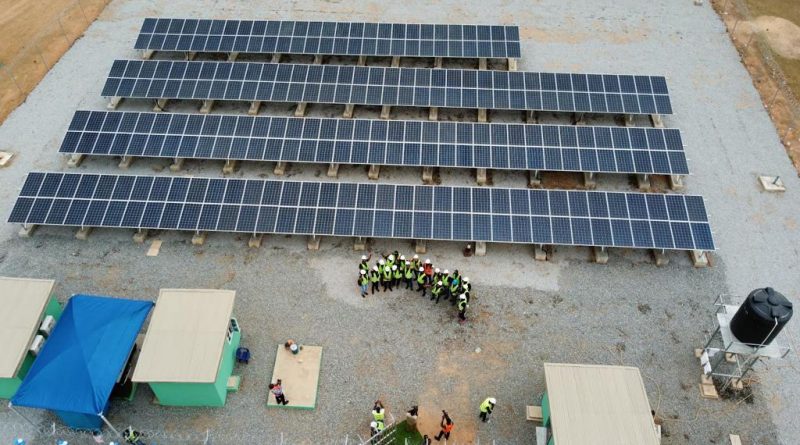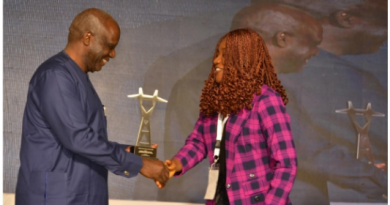Gbangba’s Mini-Grid Underlines Solution In Unserved Rural Communities
The inadequacy of traditional grid networks to provide reliable electric power for rural communities in large and diverse rural populations such as Nigeria makes alternative solutions imperative in solving the challenge of rural electrification.
Hence, the recent inauguration of ENGIE Energy Access’ solar hybrid 90-kW mini-grid in Gbangba, in Gbako Local Government Area of Niger State, was a perfect fit and an eloquent testament of the capacity of the private sector to support government in its quest to find a lasting solution to electricity challenge in the country.
According to the Rural Electrification Agency (REA), there are about 26 million Nigerians living in rural communities whose energy needs per month is as low as one kilowatt per hour, yet unable to access power from the existing national grid..
Furthermore, REA reveals that over 80 million people lack access to quality electricity despite that 51 million are connected to the national grid. Around 32 million are categorised as being unserved and underserved.
Gbangba, an agrarian rural community had never been connected to the national grid in over 100 years of its existence until ENGIE Energy Access took the bold step to construct the 90-kW solar mini-grid in the community, which was completed in December 2021.
From that time up until the start of commercial operations on April 12, 2022 when the facility was formally inaugurated, residents of Gbangba enjoyed free electricity supply to their homes and businesses, making it the first time they would ever have access to electric power not supplied through generators.
Prior to the power project, Gbangba residents had lived with the high cost of fuelling and maintaining diesel and petrol-powered generating sets to keep social and economic activities going. Basic energy needs like grinding soup ingredients, corn, millets and cassava, charging cell phones and pumping of water to irrigate crops, were by generators.
At times, they travelled to nearest towns like Bida, a 47.5-km distance, or Minna the state capital, a 51-km distance, for complex tasks that generators lacked the capacity to handle. Huge agricultural and industrial potentials of the area were largely untapped as a result of low attraction of investors.
Lack of electricity affected many small businesses as well as discouraged ownership of assets that could boost socio-economic prosperity. However, ENGIE Energy Access’ 90-kW facility became the game-changer. Today, more than 300 Gbangba households, and micro and small enterprises have been empowered by connecting to the mini-grid. Over 1,500 lives are being directly impacted and their lives changed for the better, while many more lives are being impacted as they connect to the grid.
In the process of underscoring the potentials of off-grid system as a solution to rural electrification problems, Managing Director of ENGIE Energy Access, Nigeria, Bankole Cardoso said the ‘‘mini-grid supports local entrepreneurs and businesses by allowing them become more efficient and productive through the use of electric appliances, productive appliances they can also get from us through appliance financing. This spans across welding, mills, trading etc.
‘‘In their homes, residents of Gbangba can now sleep with fans on; their children can study at night without need for lanterns or candles; they can have a cold drink of water or beverage from their fridge (which they are owning for the first time); or my personal favorite, they can continue to enjoy the peace and tranquility the community offers without the noise of generators, just to mention a few.’’
It is gratifying to state that no fewer than 11 Gbangba residents now own cold storage appliances ranging from 100 to 250 litre-capacity refrigerators and deep freezers, courtesy of appliance financing by ENGIE Energy Access. Some other residents own electric grinding and milling machines, and agro-processing gadgets including two nos. of 20hp motors and one 15 hp motor, also through the financing scheme. Light industrial activities such as welding and wrought iron are on the rise too.
Fatima Naworro, Aishetu Asabe, Fati Alfa, Ibrahim Mahmood (Zaaki), Hussaini Musa, Nma Dokoshi, Mohammed Abubakar, Baba Kolo Mohammed, Mohammed Ndakomadu Saidu, Adamu Danjuma, and Mohammed Gbangba are among proud owners of cold storage facilities that are providing comfort to their families and sources of income.
Aishetu Umaru owns an electric grinding machine; Mohammed Gbangba has acquired electric motors for milling and grinding machines for commercial uses, while Amari Sule, a popular welder in the community, is among numerous artisans whose trade is enjoying a boom.
Expressing his joy for the electricity project, Gbangba Village Head, Ibrahim Mammud, said it was like a dream because the community had been unelectrified for over 100 years. “For 100 years or more since this community has been in existence, we have never had electricity. Other communities along the road have electricity supply but we didn’t have until now when these people decided to come and bring light to us,’’ he said.
He also said ENGIE Energy Access surprised them by asking interested customers to pay a token of N1,000 to get electricity, while commending the mini-grid as a welcome development. ‘‘When they first came, we thought it was a joke but today, we can all see that it is real”.
Rural communities are notable for their high poverty rate. The mini-grid will help Gbangba residents to save money from the cost of fueling and maintenance of generators, and travel expenses to places like Bida and Minna for electricity to do complex things. The residents will now be able to create more wealth through savings and investment, and many youths setting up small businesses thereby reducing poverty significantly.
The mini-grid has the potential to quadruple employment in the community. In addition to the direct employment of some Gbangba residents, especially youths for the day-to-day operations of the mini-grid by ENGIE Energy Access through, electricity will naturally lead to a rise in the number of business creators and incubators. More jobs for the army of unemployed youths will bring down the crime rate in the area. Job creations will also boost revenue for the government as many business owners pay taxes.
Gbangba will also transform in status from being a rural setting over a period of time as ENGIE Energy Access leverages the mini-grid to deepen financial inclusion and digital access. Residents of Gbangba now empowered to use financial technology solutions to make payment to load their prepaid metres, will derive more value.
More e-payment channels can now be deployed in the community with corresponding increase in payment agents because the problem of electricity to charge POS devices has been solved. As the economy of the community improves, financial institutions may also consider branch expansion to the community.
Socially, the 90-kW facility making it the first time Gbangba people would ever have access to electric power supply not supplied through generators, means many residents of Gbangba witnessed the beginning of real development in the community for the first time. Also, hundreds of children who were used to lanterns and lamps as sources of light were seeing electricity for the first time in their lifetime.
As a renewable source of energy, the mini-grid will improve the environment and health of Gbangba people. They will spend less on hospitalisation and medical expenses, thereby increasing their productivity. Solar energy is replenishable and inexhaustible. Nigeria being blessed with good weather means the power plant in Gbangba is a sustainable investment and it guarantees long usage for the community.
CEO of ENGIE Energy Access, Gillian-Alexandre Huart, described the Gbangba hybrid 90-kW mini-grid as the company’s first significant step to complement the national grid expansion, while providing access for more people in unelectrified communities in Nigeria. He disclosed that the company planned to build over 100 mini-grids in Nigeria over a given period of years.
‘‘Today’s inauguration is indeed not only a win for this community but an auspicious sign for Nigeria at large, as it is the beginning of the materialisation of our commitment to build more than 100 mini-grids across the country, and playing our part in meeting the growing decentralised energy needs,’’ he stated.
Huart added that ENGIE Energy Access was committed to deploying solar home and mini-grid solutions in underserved communities in Sub-Saharan Africa to alleviate power challenges. He revealed that Gbangba mini-grid made Nigeria the fourth country after Tanzania, Zambia and Uganda where similar projects had been done, while the inauguration of the first site in Benin Republic would come on stream soon.
Niger State Governor, Abubakar Bello, who inaugurated the mini-grid, said the power project was a result of concerted efforts to change the negative narratives and stimulate economic activities in the rural areas while improving the standard of living in the state.
Commending ENGIE Energy Access, the governor expressed the confidence that Gbangba mini-grid would catalyse many businesses to spring up in the community within the short possible time, as well as boost the economic and social status of men, women and youth in the area. It will also go a long way in improving their living standard.
Bello, who was represented by the Commissioner for Works and Infrastructure, Mamman Musa, appealed to the people of Gbangba to take ownership of the mini-grid and guard it against vandalism in order to serve them optimally and efficiently.
As government at the federal and state levels intensifies efforts aimed to shrink the number of unelectrified communities in Nigeria, experts are of the view that solar home system and mini-grid solutions are among affordable, efficient and clean alternative power sources that countries can leverage to increase access to electricity for the unserved and underserved communities that national grid networks cannot cater for.



